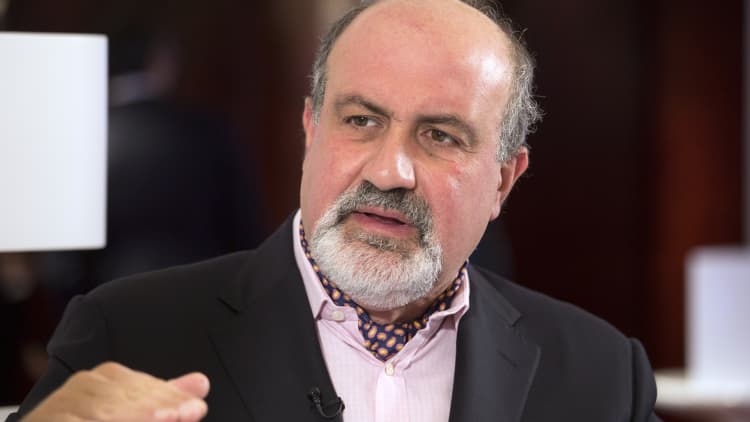While the "Fragile Five" - India, Indonesia, Brazil, Turkey and South Africa - have been among the hardest hit amid the turmoil in emerging markets, famed economist Nouriel Roubini says the threat of a full-fledged currency, sovereign-debt and banking crisis remains low.
"All have flexible exchange rates, a large war chest of reserves to shield against a run on their currencies and banks and fewer currency mismatches (for example, heavy foreign-currency borrowing to finance investment in local-currency assets)," Roubini, nicknamed Dr. Doom for his generally bearish views, wrote in an op-ed on the Project Syndicate website on Friday.
(Read more: IMF calls for 'urgent action' amid EM crisis)
"Many also have sounder banking systems, while their public and private debt ratios, though rising, are still low, with little risk of insolvency," he said.
Roubini, a professor at New York University's Stern School of Business and chairman of Roubini Global Economics, said optimism around emerging markets is "probably correct" given robust medium-term fundamentals in most including urbanization, industrialization and the rise of a consumer society.
Nevertheless, he cautions that the next year or two will be a bumpy ride for many emerging markets as governments implement sounder policies.
"The short-run policy tradeoffs that many of these countries face - damned if they tighten monetary and fiscal policy fast enough, and damned if they do not - remain ugly," he said.
(Read more: Emerging market funds lose $9 billion in past week: Data)
Internal macroeconomic and structural vulnerabilities and external risks will continue to cloud their immediate outlook, he added, pointing to the continued threat of a hard landing in China and the Federal Reserve's tapering of its long-term asset purchases and subsequent rise in interest rates.
"These risks will not wane anytime soon. Indeed, the failure of many emerging-market governments to tighten macroeconomic policy sufficiently has led to another round of currency depreciation, which risks feeding into higher inflation and jeopardizing these countries ability to finance twin fiscal and external deficits," he said.

Last week, central banks in Turkey, India and South Africa were forced to raise rates to stave off currency collapses and an exodus of foreign funds.
However, the U.S. Federal Reserve's decision last week to further withdraw its liquidity, combined with weaker economic data out of China, meant that respite provided by monetary policy tightening was relatively short-lived.
Ending the turmoil
Kathy Lien, managing director of FX Strategy for BK Asset Management says in order for the mayhem in emerging markets to abate, it may take more than just higher interest rates.
(Read more: Emerging market rout 'a long time coming': Rhodes)
"Higher interest rates are generally the first strategy that central banks use to defend their currencies but as we have seen with the U-turn in the Turkish Lira and sell-off in the , it is not always successful. To draw in foreign investors, the compensation in interest rates needs to exceed the potential decline in the currency," she said.
"If today's crisis were to worsen, coordinated interest rate hikes or devaluation by emerging market nations along with IMF liquidity could be the painful but necessary resolution that these countries need," she said, referencing historical examples of times these measures were implemented to resolve crises in Mexico, Russia and Argentina during the 1980-1990s.
—By CNBC's Ansuya Harjani. Follow her on Twitter: @Ansuya_H


